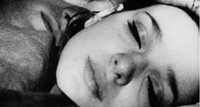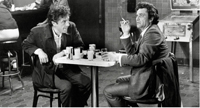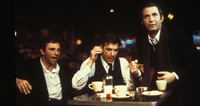from tiff
 Now firmly entrenched in film history as the “father of American independent cinema,” John Cassavetes was in his day one of the most controversial, even reviled figures in American film, regularly lambasted by both the Hollywood establishment and the mainstream press. After attaining considerable success as an actor in studio films, Cassavetes bit the hand that fed him by decrying the falsity of typical Hollywood product and declaring the need for a new, freer cinema to replace it. Often shot in Cassavetes’ own house, with friends and family frequently cast in small or large roles, his fiercely independent films were often attacked as pretentious, shapeless and selfindulgent by some of the most influential critics of the day, the dreaded Pauline Kael chief among them.
Now firmly entrenched in film history as the “father of American independent cinema,” John Cassavetes was in his day one of the most controversial, even reviled figures in American film, regularly lambasted by both the Hollywood establishment and the mainstream press. After attaining considerable success as an actor in studio films, Cassavetes bit the hand that fed him by decrying the falsity of typical Hollywood product and declaring the need for a new, freer cinema to replace it. Often shot in Cassavetes’ own house, with friends and family frequently cast in small or large roles, his fiercely independent films were often attacked as pretentious, shapeless and selfindulgent by some of the most influential critics of the day, the dreaded Pauline Kael chief among them. 
It has taken decades of dedicated work by his devoted following—and his influence upon such major contemporary directors as his friend Martin Scorsese, Sean Penn, Paul Thomas Anderson and Luc and Jean-Pierre Dardenne—for Cassavetes’ true significance to be recognized. Often regarded as an “actor’s director,” Cassavetes developed a rigorous working process designed to free his actors—both professional and non-professional—from the practiced reflexes and received notions of the drama they were performing; to dig deeper, to peel away the surfaces of their characters and reveal the tender truths of the person underneath. The result was a new type of film, one that resisted classification not because it was evasive or ambiguous, but because it was so startlingly direct: a rawer, truer vision of contemporary American life achieved by a radically new conception of film art…more
The result was a new type of film, one that resisted classification not because it was evasive or ambiguous, but because it was so startlingly direct: a rawer, truer vision of contemporary American life achieved by a radically new conception of film art…more

Comments are closed.